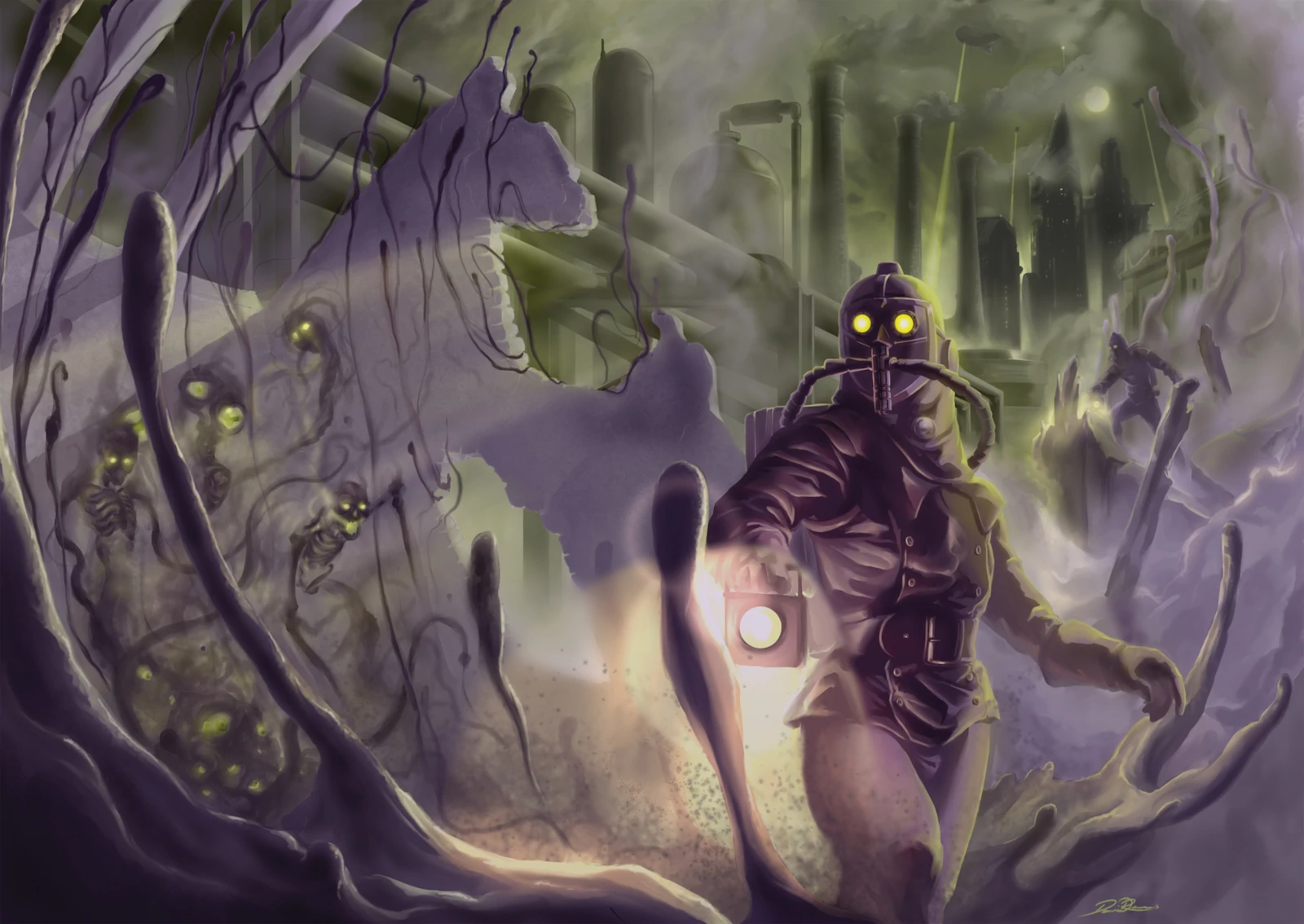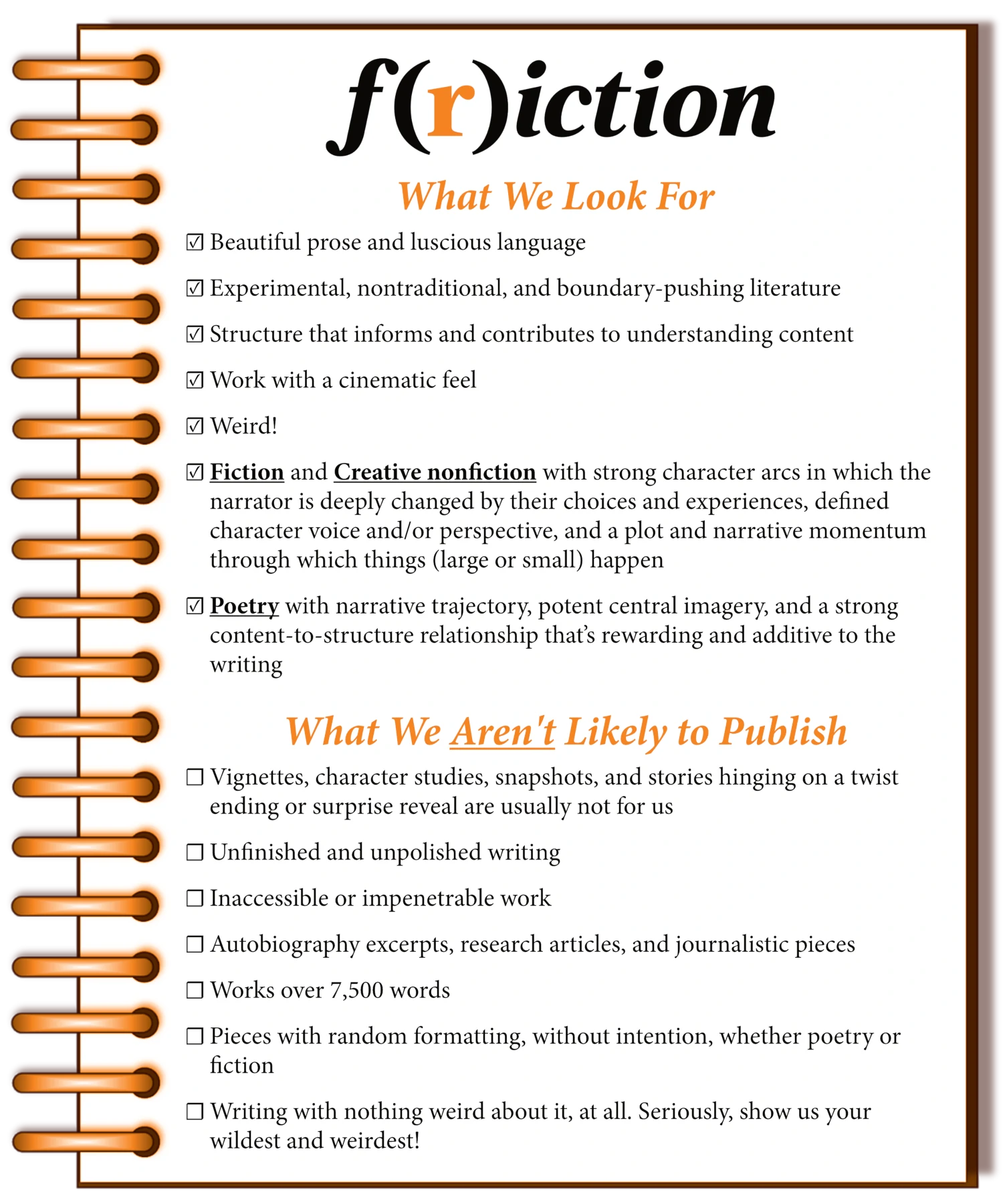
What We Look For
For our print magazine, we accept short fiction, flash fiction, creative nonfiction, and poetry—regardless of genre, style, or origin. Experimental, nontraditional, and boundary-pushing literature is strongly encouraged. We also have a special affection for stories of transformation. Show us your wildest and weirdest! To get an idea of the kind of work we look for, our editors have put together these helpful tips. We’d also recommend reading this CLMP Member Spotlight article to get a feel for the ethos behind what we do.
Please find some quick tips regarding our publishing preferences in our What We Look For graphic. If you’re seeking even greater detail with linked examples, keep reading!
An extra insider tip for you all: We strongly encourage you to check out the examples linked below. Better yet, we would really encourage you to pick up a past issue of F(r)iction, available in our shop.

Short Fiction
F(r)iction celebrates and welcomes all forms of short fiction:
- flash
- short stories
- experimental forms (we’ve published fiction in the form of a calendar before and a story told from the perspective of a road… if that helps.)
We are particularly drawn to works with:
- strong character arcs in which the narrator is deeply changed by their experiences
- strong character voice and/or perspective
- structure that informs and contributes to understanding content
- language that surprises (who doesn’t like pretty sentences?)
- strange situations, characters, occurrences, you name it—if it’s weird, we want to see it
- stories of transformation
We are not looking for:
- novellas, novels, anything over 7,500 words is a tough sell
- unfinished, unpolished work
- quiet, desperate stories where nothing happens (if you think, “Wow, I could see this published in The New Yorker,” you should probably send it there instead)
To familiarize yourself with the sort of fiction we tend to gravitate toward, check out these samples:
Short Stories
- From the Roof of the Henry Vaughn Hotel, by Peter H. Z. Hzu
- Summer Home, by Brett Riley
- The Pillars of Creation, by Walter Thompson
- Amorpho and the Leering Freak, by Jason Baltazar
- How to Make a Peanut Butter and Jelly Sandwich, by Samantha Schmidt
- You Die in the End, by Nicole Hebdon
- Interstellar Space, by Scott O’Connor
Flash Fiction
- The Forgiveness Machine, by Joy Baglio
- Disappearing Act, by David Galef
- November 1993, by Jennifer Fliss
- Colossal, by Tara Laskowski
Poetry
We are particularly drawn to poetry that capitalizes on three main elements:
- narrative trajectory
- central imagery
- strong content-to-structure relationship (If you pop words randomly all over the page, we should be able to suss out why based on the words themselves.)
We are not looking for:
- pieces that are inaccessible (we want to be challenged to dig deeper, but not so much that we have no idea what you’re saying)
All of the examples on the F(r)iction website are worth a look but three in particular that exemplify these elements are:
- Three Poems, by Joe Dunthorne
- Three Poems, by Kay Ulanday Barrett
- Three Poems, by Kelli Russell Agodon
- Watch Face, by Laura Da’
Creative Nonfiction
F(r)iction celebrates and welcomes all forms of creative nonfiction:
- flash
- hybrid
- memoir excerpts
- personal essays
- braided narratives
We are particularly drawn to works with:
- interesting structures that help to propel the narrative forward—we aren’t looking for pieces that are just weird for weirdness’ sake, they need to be weird for a reason
- strong character arcs in which the narrator is deeply changed by their experiences
- strong character voice and/or perspective
- a cinematic feel, typically due to the use of fiction craft techniques to recount the unfolding of events
We are not looking for:
- autobiography excerpts
- research articles
- pieces that are journalistic in nature
- things that aren’t true (for things that are made up, see: Short Fiction)
To familiarize yourself with the sort of CNF work we tend to gravitate toward, check out these samples:
- To Get to Sleep, by Benjamin Kinney
- Riding Dinosaurs with Boys, by Tatiana Schlote-Bonne
- The Lunatics’ Ball, by Jacqueline Doyle
- An Abecedarian of Loss, by Sherry Shahan
- First Cry, by Seth Z. Herman